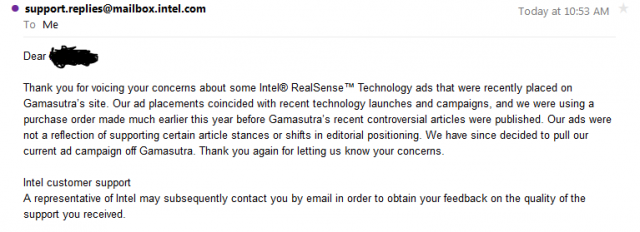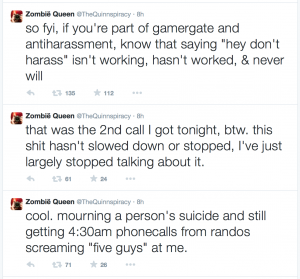![Intel issues #GamerGate apology, still not advertising at Gamasutra [Updated]](https://cdn.arstechnica.net/wp-content/uploads/2014/10/intel-gamergate.jpg)
UPDATE: On Friday, Intel issued a statement via its company blog to apologize for its part in the #GamerGate conversation. The post began with an acknowledgement that the company pulled ads from news site Gamasutra, confirming that the company would "not continue with our current ad campaign" there after receiving a wave of user complaints.
"Our action inadvertently created a perception that we are somehow taking sides in an increasingly bitter debate in the gaming community," the post continued. "That was not our intent, and that is not the case. When it comes to our support of equality and women, we want to be very clear: Intel believes men and women should be treated the same."
The post concluded by decrying "any organization or movement that discriminates against women," then saying, "we apologize and we are deeply sorry if we offended anyone." Intel's apology did not acknowledge the content of Leigh Alexander's September article, nor any other concerns or complaints attributed to #GamerGate.
Original story: Intel pulled an advertising campaign from the gaming news site Gamasutra this week after the company received complaints related to an opinion piece the site ran about gamers, according to Gamasutra's Twitter account. The complaints were part of a pressure campaign organized by supporters of the #GamerGate hashtag who took offense to a number of articles about changes in gaming culture.
The Gamasutra article in question was "'Gamers' don't have to be your audience. 'Gamers' are over" by Leigh Alexander. In it, she described some of the tensions that have arisen in gaming culture as the audience has shifted from being composed mostly of the early adopters that commercial studios targeted ("young white dudes with disposable income," as Alexander put it) to today's much broader mix of players.Alexander said that gaming no longer belongs to a narrow "gamer" demographic that has sometimes displayed hostility toward those perceived as encroachers, like Anita Sarkeesian (producer of the Women vs. Tropes in Video Games video series) and Zoe Quinn (developer of the game Depression Quest). Gaming culture, Alexander said, has a responsibility to make room for new perspectives and audiences. The hostility toward people like Quinn and Sarkeesian came from people who "know so little about how human social interaction and professional life works that they can concoct online ‘wars’ about social justice or ‘game journalism ethics,’ straight-faced, and cause genuine human consequences," Alexander wrote.
Alexander's article and others like it helped stir up the #GamerGate movement, which eventually focused its efforts into Operation Disrespectful Nod. The operation aimed to undermine a handful of sites that ran articles on #GamerGate, including Ars Technica, encouraging supporters to e-mail known advertisers at the sites and complain about content.

Operation Disrespectful Nod posted a link to an Intel contact form that #GamerGate supporters could use to complain to the company about its advertising on Gamasutra. Intel had been running a campaign on the site for its RealSense platform, and it confirmed to Re/code that the campaign ended early after the complaints.

The #GamerGate campaign and its many offshoot issues have been divisive; even 4chan has banned discussion of the topic, driving its supporters to other forums. But as companies like Intel respond to public pressure by pulling ad campaigns, it appears that #GamerGate is nowhere close to being over.
reader comments
1462